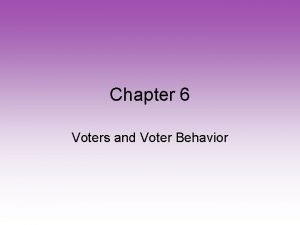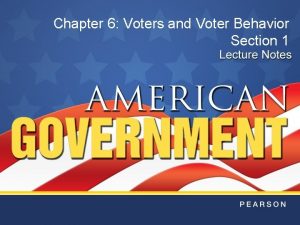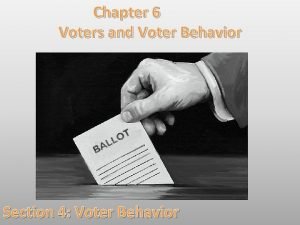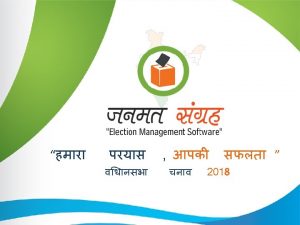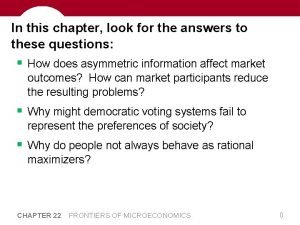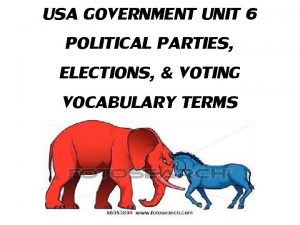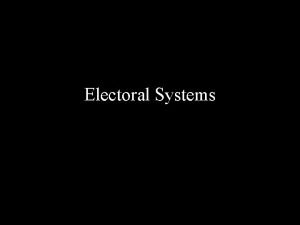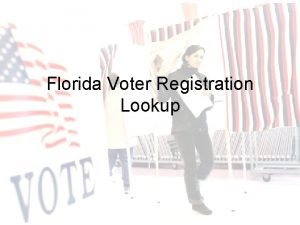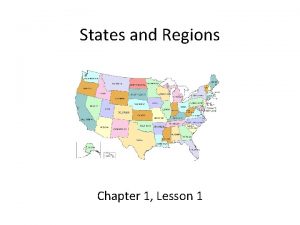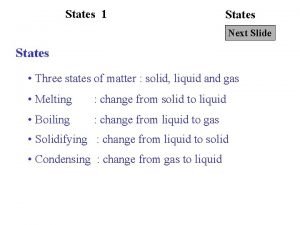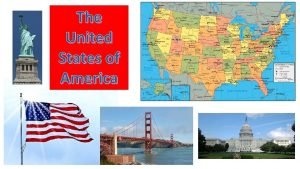Voter Qualifications in the United States Who has
















- Slides: 16

Voter Qualifications in the United States Who has been allowed to vote in America’s past? What do I need to know in order to vote?

Early Requirements • Literacy test • Polling tax • Property requirements • Requirement age was 21 years of age.

Today Requirements National Requirements – Citizenship – Residence – Age (18+) – Registration State of Alabama Requirements - Must be a resident of the state (must show state issued photo id) - NOT been convicted of a disqualifying felony. - NOT be declared "mentally incompetent" by a court. https: //www. dmv. org/al-alabama/voter-registration. php

What factors influence whether or not a person will register to vote? • Sociological Factors: – Income / Occupation – Level of Education – Gender / Age – Cultural background – Family • Psychological Factors: – Party Identification – Candidates – Particular issues

Why do Americans choose not to vote? • Many voters who do not exercise their right are known as “cannot-voters”. • The act of not exercising your right to vote is also called “abstain”. • Reasons: – Illness / physical limitation – Religious beliefs – Weather – Difficulty in registration – Number of elections – Voter apathy

What is “suffrage”? • The “suffrage” movement in America is an ever evolving one – Guarantees citizens the right to vote • Has been fought over in regards to race, age, and gender

What were the stages of America’s suffrage fight? • Five (5) stages: - No religious tests, property ownership requirement (1800’s) - African-Americans get the right to vote (1870 - 15 th Amend. ) - Women get the right to vote (1920 - 19 th Amend. ) - Full racial equality / end of literacy tests / poll taxes (Civil Rights Act of 1965) - Lowering of voting age to 18 (1971 - 26 th Amend. )

Women’s Suffrage • Nineteenth Amendment (Ratified August 1920)- The right of citizens of the United States to vote shall not be denied or abridged by the United States or by any State on account of sex. Congress shall have power to enforce this article by appropriate legislation.

Civil Rights and Suffrage • Property Tax, Literacy Test (Grandfather Clause), Poll Tax were all used as a way to keep African Americans from voting • Fourteenth Amendment (Ratified July 1868)- All persons born or naturalized in the United States and subject to the jurisdiction thereof, are citizens of the United States, and of the State wherein they reside. No State shall make or enforce any law which shall abridge the privileges or immunities of citizens of the United States; nor shall any State deprive any person of life, liberty, or property, without due process of law; nor deny to any person within its jurisdiction the equal protection of the laws.

Civil Rights and Suffrage • Fifteenth Amendment (Ratified February 1870)Section 1: The right of citizens of the United States to vote shall not be denied or abridged by the United States or by any State on account of race, color, or previous condition of servitude. • Voting Rights Act of 1965 - An act passed in 1965 that protected the right to vote for all U. S. citizens. It forced the states to obey the U. S. Constitution. It made it clear that the right to vote could not be denied because of a person’s color or race.

Other Amendments and Changes • Twenty-fourth Amendment (Ratified January 1964)- Section 1: The right of citizens of the United States to vote in any primary or other election for President or Vice President, for electors for President or Vice President, or for Senator or Representative in Congress, shall not be denied or abridged by the United States or any State by reason of failure to pay any poll tax or other tax. • Twenty-sixth Amendment (Ratified July 1971)- Section 1: The right of citizens of the United States, who are eighteen years of age or older, to vote shall not be denied or abridged by the United States or by any State on account of age.

Review • https: //www. youtube. com/watch? v=P 9 Vdy. Pbbzl. I • Keep in mind – - White Male Suffrage - Founding Fathers’ View on Voting

Voter Influences What influences voters?

Party Loyalty • Vote for one particular party – Straight-Ticket Ballot • Liberal – Left of the middle • Conservatives – Right of the middle • Moderates – In the middle – Weak Party Voters- independent Voters

Other influences • Issues - Crossed Pressure Voter – caught between two issues • Media and Public Opinion - television – become the best communication tool for politicians to get to voters

Influences • Candidates - May like or dislike a certain candidate and where they stand on an issue or how they have been in office - 1980 election – Reagan wins because of the issue of economy
 The united states has a mixed economy true or false
The united states has a mixed economy true or false What the united states has fought for
What the united states has fought for Chapter 6 voters and voter behavior
Chapter 6 voters and voter behavior Chapter 6 voters and voter behavior
Chapter 6 voters and voter behavior Chapter 6 section 4 voter behavior
Chapter 6 section 4 voter behavior Gilded age westward expansion
Gilded age westward expansion Voter parchi software
Voter parchi software Voting behaviour essay
Voting behaviour essay Median voter theorem
Median voter theorem Cross pressured voter definition government
Cross pressured voter definition government Median voter theorem
Median voter theorem Florida voter id lookup
Florida voter id lookup European parliament voter turnout
European parliament voter turnout What is the current intraregional migration trend in the us
What is the current intraregional migration trend in the us 5 regions of united states
5 regions of united states Many _____ people have settled in this megalopolis.
Many _____ people have settled in this megalopolis. North south east west in our calm objective opinion
North south east west in our calm objective opinion


